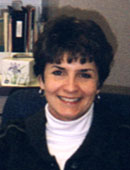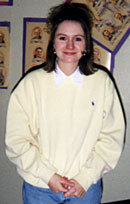
Profile of a Burden
by Cara Hetland
February 10, 2000
|
During five months of watching the standards in action, our reporters found that many complaints stemmed from teachers faced with suddenly expanded workloads. Much of the work comes from the 48 standards that make up the Profile of Learning. Teachers measure student achievement on these standards through projects known as performance packages that can take weeks to accomplish. The burden on teachers may be most evident in smaller districts.
Regular course work gets traditional points or letter grades. The performance packages can also get a traditional grade but they must receive a score from one to four to measure how well a student does on a state content standard. Teachers throughout the state complain about the additional work, but it seems a little more burdensome for those in smaller districts. Cyndi Ebert teaches at Hills-Beaver Creek High School. Ebert: I teach English 7, 9, 10, Writing and Research and American Lit. And second semester, I will be teaching AP English and Reading 7 in place of Writing and Research and American Lit.While teachers in larger districts often teach several sections of one or two courses, it's not uncommon for teachers in smaller districts to teach five different classes in a day and even teach two different levels in the same class - like art. Ebert: I can think of several classes that I'm doing literature in and so I'm reading right along with the students. Some years I'm reading Romeo and Juliet and Hamlet and MacBeth all at the same time in different classes, and try to keep the story line straight and make out quizzes and be ready to discuss and help the students with what's going on.Ebert says for the most part, the workload comes with the field she teaches. But the Profile of Learning magnifies the challenge. English can encompass the reading, writing, speaking, and listening standards, depending on how districts decide to spread the standards through their course offerings. She says regardless of having five different courses to teach or several sections of the same class, all English teachers have mountains of papers to grade. Her room at the end of the hall on the second floor of the high school reflects the varying levels she teaches. There are posters promoting book orders for seventh-graders and posters explaining bibliography techniques for seniors writing research papers. Ebert says not only does she have courses to prepare for, but she also has a classroom to manage. She says the Profile of Learning performance packages only adds to her workload and her frustration. Ebert: I would like to meet the authors of some of these packages. I would like them to visit various school districts and not just for a day but for weeks to really sit in a classroom and see what a teacher's day is like and then maybe they could see why we feel so overwhelmed with these packages.The complaint about workload frustration seems to come more often from veteran teachers than those in their first or second year. First-year history teacher Rochelle McGill has little to say about the graduation standards pro or con because the new system is all she knows. McGill is responsible for teaching four performance packages. Next year the number could rise to nine. McGill: It's a lot more than what I had thought it would be, but then again as a first year teacher, it's also kind of nice to have something set out for you, some sort of lesson so you don't have to - when you're teaching five different subjects you're always getting something ready and with a grad package, you follow it.
Janet Knoll is the graduation standards technician and elementary principal in Beaver Creek. She says integrating standards into the curriculum - like McGill is doing - is exactly the intent of the Profile of Learning. Knoll says the paperwork has decreased since the profile was mandated two years ago. But even less paperwork draws complaints from some teachers who say they're frustrated over mixed messages and changes to an already confusing system. Knoll: As the messenger, as the grad standards technician, here was my direction: This is what we need to do. And then a number of months later had to come back and say, "No, that's going to be different now." So sometimes I felt like they put the cart before the horse and were asking us to start things in our district before the big picture was really ready.Teachers at Hills-Beaver Creek say they're working through the bugs and agree the Profile of Learning is still in its infancy. Knoll says the principle behind the change is worthwhile and that's offering students a new way to learn and an opportunity to digest information differently. Knoll: I would guess that students that are in Kindergarten now will grow up doing a lot more of these and will have a far different view of things parents will have a far different view of things. Things will change a lot over the next 10 years if this all remains in place.
English teacher Cyndi Ebert says what's happening now matters more to her. Ebert: I really don't think that they're making me be a better or a worse teacher at this point. But they're making me be a frustrated teacher, and I think that just sort of effects my overall morale, so to speak.In a town of 600, where the school is the center of the community, teacher frustration is evident to almost everyone. Parents, however, seem to be taking a wait-and-see approach. They're watching test scores closely to judge if the higher standards are helping or hurting the kids. |
|||||||||||||||||||||||||||



